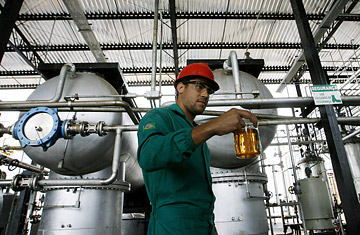
A worker shows a sample of biodiesel made from castor beans at a biodiesel refinery in Iraquara, 310 miles west of Salvador, Brazil.
As soaring commodity prices spark food riots around the globe, prompting a U.N. official to dub the production of biofuels at the expense of food cultivation "a crime against humanity," the debate over the efficiency and morality of using plants as an energy source is heating up. And Brazil, the world's largest producer of biofuels and leader in cheap and efficient production of ethanol, is fighting back against what it calls "disinformation and dishonesty."
A number of recent studies have suggested that ethanol production does more harm than good to the environment, and is at least partly responsible for the sharp jump in global food prices. And U.N. Special Rapporteur on the Right to Food Jean Ziegler caused a stir when he told a radio interviewer, "Burning food today, so as to serve the mobility of the rich countries, is a crime against humanity," and called for a five-year moratorium on further production. Skepticism of the environmental cost-benefit advantages of biofuels has been echoed in a number of articles and op-eds in major Western media outlets, including TIME.
But Brazil's President Luiz Inacio Lula da Silva complains that the criticism is driven by an ulterior motive. He suggests it forms part of a concerted effort by the industrialized world to prevent Brazil, one of the world's most important agricultural powers, from taking its place at the top table. The problem, he argues, lies with the "same old policies of the rich countries," such as subsidies and tariffs.
"Biofuels are not the villains threatening the food security of poorer nations," Lula told delegates at the Food and Agricultural Organization's regional conference in Brasilia last week. "Quite the contrary, as long as they are developed with the right criteria, and in keeping with each nation's own reality, they can be essential instruments for generating wealth and lifting nations out of food and energy insecurity... The real crime against humanity is discounting biofuels a priori."
Brazil's rebuttal to the recent questioning of ethanol's reputation as an environmentally friendlier energy solution has won some support among energy experts. Some have blamed oil companies and food conglomerates for driving the bad publicity; others questioned the science in recent ethanol-bashing studies. And many saw it simply as a panic reaction to rising grain prices and the resulting instability.
"I think that the sudden rise in price of food has got people looking for causes, and biofuels are a convenient scapegoat," says Reid Detchon, Executive Director of the Energy Future Coalition, a think tank funded by the U.N. Foundation. "There's a connection to some degree... but increased demand from Asia for grain-fed meat, combined with some other factors like oil prices, droughts in wheat-producing countries, and the demand for corn in the U.S. for ethanol, have all contributed to this sudden price spike. Ethanol is not the major factor."
Brazil is most angered by critics' failure to distinguish between the sugar-cane-based ethanol produced in the tropics and the more expensive and less efficient ethanol that comes from wheat, corn, beets and other crops grown in more temperate climes.
Sugar-cane-based ethanol is up to eight times more efficient than its corn counterpart. (The amount of energy produced by one unit invested in producing sugar-cane ethanol is up to eight times greater than the amount of energy produced by investing that same unit in the process of making corn ethanol.) The crop itself uses less fertilizers and pesticides, and Brazilian farmers who grow it do not receive government subsidies. Crucially, Brazil last year exported two-thirds of its sugar crop, meaning no cane was diverted from human consumption to produce ethanol.
"Food versus fuel is not an issue in Brazil," says Marcos Jank, the president of Unica, the Brazilian Sugar Cane Industry Association. "Sugar prices today are depressed because there is too much production."
Jank and other Brazilian officials are on shakier ground when they deny that the thirst for ethanol is causing deforestation in the Amazon, as farmers clear trees to plant crops. Because sugar cane is grown in the more fertile center of the country, they point out, no forest is cleared. But environmentalists respond that even though few trees are cut down to make way for cane plantations, the massive investment in the sector — an estimated $30 billion between 2006 and 2015 — has put pressure on cattle farmers. Green groups say some have sold their land south of the Amazon to sugar growers and are using the money to buy cheaper land further north on the edge of the forest.
Even so, Brazil has more than enough land available to keep planting sugar cane, government officials said. Brazil's current sugar cane crop covers 7 million hectares — 2.3 % of its arable land. And although that total is expected to grow by 12% a year over the next five years, there is still around 160 million hectares of arable land ready to be sown, said Alexandre Strapasson, director of the Sugar Cane and Agroenergy department at Brazil's Agriculture Ministry.
With proper management, some experts say, Brazil can ensure its sugar-cane expansion occurs on readily available farmland. But that's a major if. And Brazil's track record in land husbandry is hardly a stellar one. Still, the government plans to continue making its case for ethanol, and the controversy over biofuels is unlikely to die down. "The battle," Lula defiantly noted last week, "hasn't even begun."
